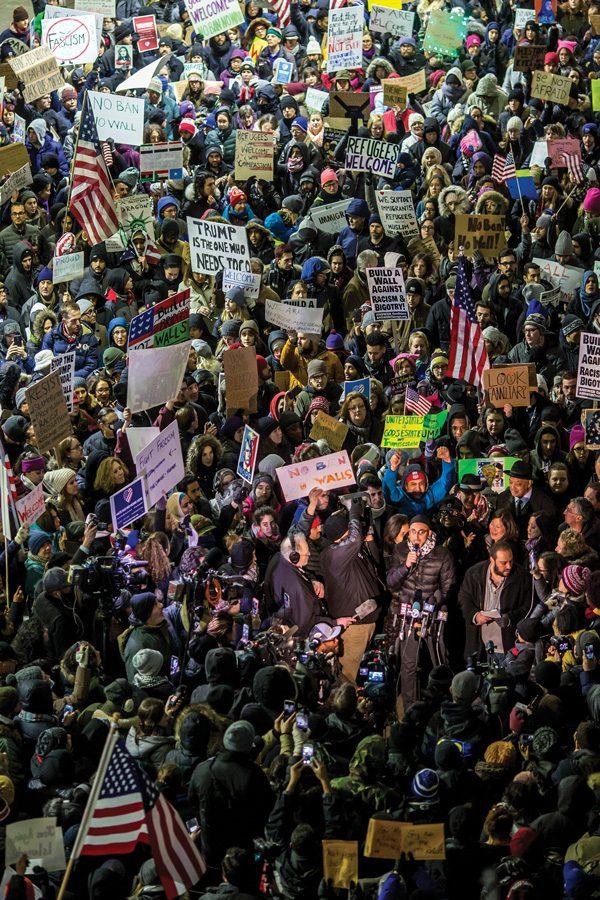Locals mobilize against Trump’s immigration actions
Brian Cassella/Chicago Tribune/TNS
Demonstrators gather Sunday outside Terminal 5 of O’Hare International Airport to protest President Donald Trump’s executive order on immigrants and refugees. Over the weekend, about 150 attorneys and at least 1,000 protesters gathered at the airport to help detainees gain entry.
January 31, 2017
On Saturday morning, Suzanne Akhras Sahloul said she woke up depressed, crying and unable to comprehend the action taken by her new president. As a Syrian immigrant, she said Donald Trump’s executive order banning immigration from that country and six others felt “very personal.”
But after a friend urged her to take action, she got out of bed and went to protest at Chicago O’Hare International Airport, where at least 16 people were temporarily detained.
Sahloul, who founded the Syrian Community Network in 2015 to assist refugees, called the order “embarrassing” and “shameful.”
“We need everyone to rally against it and speak up,” Sahloul said. “Because if we don’t, it means we agree with his decision.”
Over the weekend, about 150 attorneys and at least 1,000 protesters gathered at O’Hare to help detainees gain entry, according to various news sources. Chicago immigration lawyer Fiona McEntee — who spent more than 12 hours at the airport — said her “heart was breaking” and that there was no justification for the discrimination.
At the airport, McEntee said she assisted clients, spoke to media and researched legal options. But officials there barred access to detainees and declined to give information, making it “extremely frustrating” for lawyers looking to help, she said.
“There was just no dialogue open at all,” McEntee said. “The overwhelming feeling is confusion. … We are trying to figure out the legal ramifications of (the law). This is something that has just happened, and there’s a lot of unknowns.”
McEntee said a lot of the confusion lay in the “poorly written” executive order, which includes ambiguous language and vague instruction.
Signed into law Friday, the executive order indefinitely banned Syrian refugees, suspended all refugee admission for 120 days and barred immigration for 90 days from seven Muslim-majority countries: Iran, Iraq, Libya, Somalia, Sudan, Syria and Yemen. But mixed messages and a rocky rollout from the White House has made enforcement tricky.
On Monday, Trump defended himself against growing concern over his order.
“If the ban were announced with a one week notice, the ‘bad’ would rush into our country during that week,” Trump tweeted. “A lot of bad ‘dudes’ out there!”
In Evanston, officials also struggled to understand the order’s implications. City manager Wally Bobkiewicz said it was too soon to gauge impact on local refugees and immigrants, but that the city would ensure its residents were “protected and taken care of.”
City Council unanimously passed a “welcoming city” ordinance in December, which prohibits city officials — including police officers — from inquiring about someone’s immigration status. And in January, both of Evanston’s school districts declared themselves a “safe haven” for families affected by any changes in immigration policy.
Following the passage of that ordinance, the city formed a task force to better understand how it could help incoming refugees. The new group — which met late last week for the second time — includes officials from the city, both school districts, Evanston police and a number of resettlement agencies.
“We are investigating, potentially, city services to assist families with their settlement here in Evanston,” said Mark Muenzer, the city’s director of community development. “We want to be very strategic and make sure that there’s no overlap.”
Muenzer estimated that there are about 100 refugee households in Evanston, but said the task force was trying to obtain more exact figures.
For decades, Illinois has been a haven for refugees seeking safety from civil war and violence abroad. In 2015, the state admitted more than 2,600 refugees, which was nearly 4 percent of total U.S. arrivals.
But after a November 2015 call from Gov. Bruce Rauner to temporarily ban Syrian refugees and Trump’s recent executive order, some see the state’s welcoming reputation changing.
In Northfield, the Temple Jeremiah congregation expected to welcome on Tuesday two sisters who have been living in Zambia for the past 18 years, executive vice president Barbara Miller said. Working with a Hebrew refugee group, the congregation had pledged to support the refugees in their transition.
But after arriving in Dubai, officials told the sisters they could not board a plane to the U.S. due to lack of “security clearance,” Miller said. She did not know if the refugees were held up because of the new executive order. As of Tuesday night, the pair had been rescheduled on a Wednesday flight, she added.
“I believe very strongly that this country is a country made of immigrants,” Miller said. “Pretty much everyone I know were immigrants at some time. That’s the strength of our country.”
Sahloul said she was concerned about the future for immigrants and refugees in America, but does not believe Trump’s executive order has a majority of the country’s support. She added that since Friday, her organization had received about 70 volunteer applications and a “small spike” in donations — signaling grassroots support to counter against the new policy.
Inspired to take action after the election, Sahloul said she was considering a bid for local office and eventually congresswoman or senator.
“We’ve become complacent under the Obama administration, because (his) policies were more open and inclusive,” she said. “Now we have to put on our boxing gloves and go out and fight.”
Email: [email protected]
Twitter: @davidpkfishman


